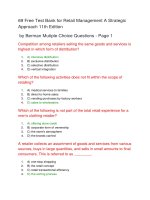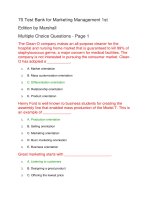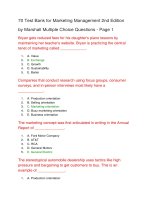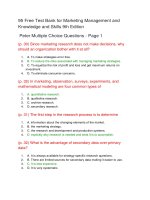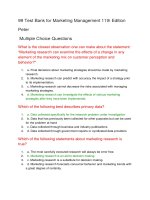80 test bank for marketing management a strategic decision making approach 8th edition by mullins
Bạn đang xem bản rút gọn của tài liệu. Xem và tải ngay bản đầy đủ của tài liệu tại đây (103.53 KB, 19 trang )
80 Test Bank for Marketing Management A Strategic
Decision Making Approach 8th Edition by Mullins
Mutiple Choice Questions
_____ in a marketing plan describe actions to be taken if specific threats
or opportunities materialize during the planning period.
1.
A. Project controls
2.
B. Contingency plans
3.
C. Action plans
4.
D. Marketing objectives
The total market for a particular product category is often fragmented into
several groups of people having relatively homogeneous needs, wants,
and sought after benefits. These groups are referred to as a market:
1.
A. promoters.
2.
B. suppliers.
3.
C. channels.
4.
D. segments.
In a company, if all the marketing functions and activities are performed
by a single internal organization and there is no involvement of an
external middleman, the company is said to be _____.
1.
A. vertically integrated
2.
B. horizontally integrated
3.
C. following the wheel-and-spoke system
4.
D. following the cohesive distribution system
_____ reflect a person’s desires or preferences for specific ways of
satisfying a basic need.
1.
A. Emotions
2.
B. Wants
3.
C. Beliefs
4.
D. Reflexes
The customers who buy goods and services for resale or to use as inputs
to the production of other goods are known as:
1.
A. ultimate customers.
2.
B. individual customers.
3.
C. organizational customers.
4.
D. service customers.
Love, esteem, and self fulfillment are examples of one’s _____ needs.
1.
A. emotional
2.
B. physical
3.
C. basic
4.
D. physiological
Which of the following components of the marketing mix is related to
advertising, personal selling, point-of-purchase displays, and publicity?
1.
A. Product
2.
B. Price
3.
C. Place
4.
D. Promotion
Which of the following is one of the components of marketing mix?
1.
A. Company
2.
B. Context
3.
C. Price
4.
D. Rivals
Hope, a non-profit organization, trains disabled individuals to engage in
small scale production. They teach them manufacture products such as
candles. They purchase wax in bulk to be used in their training programs.
Wax purchased in this case is an example of a(n) _____.
1.
A. consumer good
2.
B. consumer service
3.
C. industrial good
4.
D. ultimate good
Brand equity reflects the value of the:
1.
A. brand name and logo as promotional tools for attracting future buyers.
2.
B. major customers who are associated with the brand.
3.
C. actual benefits that a product or brand provides.
4.
D. market segments in taking decisions regarding a new product launch.
_____ is the combination of controllable marketing variables that a
manager uses to carry out a marketing strategy in pursuit of the firm’s
objectives in a given target market.
1.
A. Market forecasting
2.
B. Advertising
3.
C. Market segmentation
4.
D. Marketing mix
_____ sell to resellers, industrial, or commercial customers, but they do
not take title to the goods they sell.
1.
A. Facilitating agents
2.
B. Agent middlemen
3.
C. Retailers
4.
D. Merchant wholesalers
Which of the following components of the marketing mix is concerned
with quality, features and customer services an offering?
1.
A. Product
2.
B. Place
3.
C. Price
4.
D. Promotion
Interrelated decisions about segments, product line, advertising appeals
and media, prices, and partnerships with suppliers, distributors, retailers,
and other agencies reflect a firm’s _____ strategy.
1.
A. marketing
2.
B. corporate
3.
C. competitive
4.
D. business-level
The customers who buy goods and services for their own personal use
are known as:
1.
A. internal customers.
2.
B. external customers.
3.
C. promotional consumers.
4.
D. ultimate consumers.
_____ strategy reflects the company’s mission and provides direction for
decisions about what businesses it should pursue, how it should allocate
its available resources, and its growth policies.
1.
A. Competitive
2.
B. Corporate
3.
C. Operational
4.
D. Business-level
The alliances or networks involved in the marketing of goods and services
in most developed economies are commonly referred to as _____.
1.
A. alternate customers
2.
B. market segments
3.
C. target clients
4.
D. marketing channels
A _____ can be defined as any activity or benefit that one party can offer
another that is essentially intangible and that does not result in the
ownership of anything.
1.
A. product
2.
B. value
3.
C. service
4.
D. sale
Which of the following sections of a marketing plan presents a short
overview of the issues, objectives, strategy, and actions incorporated in
the plan and their expected outcomes for quick review?
1.
A. Executive summary
2.
B. Key issues
3.
C. Objectives
4.
D. Action plan
A business-level strategy addresses:
1.
A. how a business intends to compete in its industry.
2.
B. how a business should define its mission and vision.
3.
C. what products should an organization produce.
4.
D. how an organization should design its marketing communication.
Ultimate customers buy goods and services for personal use or _____.
1.
A. for the use of others in their immediate household
2.
B. as inputs to production of other goods
3.
C. for resale to other customers
4.
D. for use in the day-to-day operations of organizations
Need for food and water are examples of _____ needs.
1.
A. security
2.
B. physical
3.
C. social
4.
D. psychological
Which of the following is the most important element that determines the
value a customer attaches to a product?
1.
A. Company resources
2.
B. Company policies
3.
C. Services provided
4.
D. Costs of production
Designing of the products and its marketing programs so as to emphasize
attributes and benefits that appeal to customers in the target segment and
at once distinguish the company’s brand from those of competitors is
referred to as _____ of the object.
1.
A. servicing
2.
B. valuing
3.
C. pricing
4.
D. positioning
Which of the following best describes lifetime customer value?
1.
A. It is the value a customer places on specific ways of satisfying a basic need.
2.
B. It is the value companies place on an individual transaction with a customer.
3.
C. It is the present value of a stream of revenue that can be produced by a
customer over time.
4.
D. It is the value a company places on selling the product to more than one
customer.
_____ is the process of analyzing, planning, implementing, coordinating,
and controlling programs involving the conception, pricing, promotion,
and distribution of products, services, and ideas designed to create and
maintain beneficial exchanges with target markets for the purpose of
achieving organizational objectives.
1.
A. Marketing communication
2.
B. Marketing control
3.
C. Strategic control
4.
D. Marketing management
Gobex International is a reputed marketing research firm. This firm is an
example of a(n) _____.
1.
A. merchant wholesaler
2.
B. retailer
3.
C. agent middleman
4.
D. facilitating agency
Customers want to purchase products with minimum of risk and shopping
time. This is referred to as _____ utility.
1.
A. possession
2.
B. place
3.
C. time
4.
D. duration
Which of the following components of the marketing mix concerns
distribution of products?
1.
A. Product
2.
B. Place
3.
C. Price
4.
D. Promotion
Which of the following is NOT one of the 4 Cs of marketing management?
1.
A. Company
2.
B. Context
3.
C. Cost
4.
D. Competitor
A society cannot reap the full benefits of specialization until it develops
the means to facilitate:
1.
A. production of essential goods such as food for domestic consumption.
2.
B. protection of local industries from external players.
3.
C. the trade and exchange of surpluses among its members.
4.
D. production of all goods that are needed for domestic consumption.
A(n) _____ is a written document detailing the current situation with
respect to customers, competitors, and the external environment and
providing guidelines for objectives, marketing actions, and resource
allocations over the planning period for either an existing or a proposed
product or service.
1.
A. strategic program
2.
B. marketing plan
3.
C. marketing mix
4.
D. opportunity analysis
Albus Technologies is a firm that functions in drastically changing
technology trends. The economic situations in the industry are also
changing drastically. Which of the 4 Cs is associated with these external
factors?
1.
A. Company
2.
B. Context
3.
C. Customers
4.
D. Competitor
_____ are essentially tangible physical objects that provide a benefit.
1.
A. Services
2.
B. Products
3.
C. Values
4.
D. Brands
Mars, a company that markets home appliances, realizes that their clients
in China would prefer it if their range of juicers were to have extra strong
blades so that it cuts through all kinds of fruits. In order to fulfill this
demand, the company modifies its product designs and marketing
programs to cater to the needs of the Chinese customers. Mars is trying
to:
1.
A. provide a unique benefit to a segment of the juicer market.
2.
B. focus on the individual transactions with customers.
3.
C. provide a unique benefit to the overall market of juicers.
4.
D. use its brand as a promotional tool for attracting future buyers.
Distinct subsets of consumers with similar needs, circumstances, and
characteristics that lead them to respond in a similar way to a particular
product or service are known as market _____.
1.
A. channels
2.
B. contexts
3.
C. spirals
4.
D. segments
eBay is an auction site that allows individual sellers list their products and
buyers purchase the listed items. This website is an example of _____.
1.
A. business-to-business
2.
B. consumer-to-business
3.
C. business-to-consumer
4.
D. consumer-to-consumer
Which of the following sections in a marketing plan discusses how the
plan’s progress will be monitored and present special plans?
1.
A. Contingency plans
2.
B. Key issues
3.
C. Action plans
4.
D. Marketing objectives
Which of the following statements is true of services?
1.
A. They can be provided by physical objects as well as people.
2.
B. Services are typically priced lower than products.
3.
C. They are functions of intrinsic product features.
4.
D. They are physical products associated with a special benefit.
The most important characteristic of marketing as a business function in
order to sustain a healthy top line is its focus on:
1.
A. customers and their needs.
2.
B. horizontal integration.
3.
C. employee productivity.
4.
D. exchange requirements.
True - False Questions
A company’s available resources and capabilities have no bearing over its
marketing objectives for a particular product-market entry.
1.
True
2.
False
Each market segment seeks a different set of benefits from the same
product category.
1.
True
2.
False
A product has greater place utility for a potential customer when it can be
purchased with minimum risk and shopping time.
1.
True
2.
False
Internal control of the full range of marketing functions and activities is
referred to as vertical integration.
1.
True
2.
False
Dell allows individuals buy personal computers by placing online orders
in the website. Dell’s website is an example of a business-to-business ecommerce site.
1.
True
2.
False
Auction sites, such as eBay, QXL are examples of Consumer-to-Consumer
(C2C) channels.
1.
True
2.
False
The boundaries between functional areas have started to blur and
marketing programs are increasingly becoming a group activity in current
business environment.
1.
True
2.
False
Implementing a marketing plan requires cooperation and coordination
across many specialized functional areas.
1.
True
2.
False
Reduced division of labor is one of the most important changes that occur
as societies move from a primitive economy toward higher levels of
economic development.
1.
True
2.
False
The purchasing, storage, promotion, and selling activities of wholesalers
and retailers allow customers to buy a wide variety of goods from a single
source in one transaction.
1.
True
2.
False
Value is a function of extrinsic features related to the environment.
1.
True
2.
False
New needs are created by marketers and other social forces by making
emotional appeals to customers.
1.
True
2.
False
Specialization of labor and economies of scale involved in an extensive
marketing system reduces its functional efficiency.
1.
True
2.
False
Advertising and salesforce decisions are part of a company’s promotion.
1.
True
2.
False
The controllable elements of a marketing program include product
offering, price, promotion, and place.
1.
True
2.
False
A service refers to any activity or benefit that one party can offer another
and that result in the ownership of something.
1.
True
2.
False
The relative strengths and weaknesses of competitors and trends in the
competitive environment is one of the 4Cs necessary to provide the
foundation for a good strategic marketing plan.
1.
True
2.
False
Marketing management involves controlling programs related to the
conception, pricing, promotion, and distribution of products.
1.
True
2.
False
The marketing manager details the financial and resource implications of
the strategy in the first part of a marketing plan.
1.
True
2.
False
A brand’s value to the company depends on how much value the
company thinks the brand provides customers.
1.
True
2.
False
A marketing plan is a written document detailing the current situation with
respect to customers, competitors, and the external environment.
1.
True
2.
False
There can never be a positive bottom line without the ability to build and
sustain a healthy top line.
1.
True
2.
False
An unsatisfied need is a gap between a person’s actual and desired states
on some physical or psychological dimension.
1.
True
2.
False
The need for security, love and belonging are basic physical needs of
human beings.
1.
True
2.
False
Merchant wholesalers sell goods and services directly to final consumers
for nonbusiness use.
1.
True
2.
False
Everything a company does internally is called a profit center of the
company.
1.
True
2.
False
People who buy goods for others in their immediate household are
organizational buyers.
1.
True
2.
False
Brand equity reflects the value of the brand name and logo as promotional
tools for attracting future buyers and building market share and
profitability.
1.
True
2.
False
When people buy products to satisfy their needs, it is the benefits of the
product that they buy rather than the products.
1.
True
2.
False
Lifetime customer value refers to the present value of a stream of revenue
that can be produced by a customer over time.
1.
True
2.
False
Free Text Questions
Discuss brand equity.
Answer Given
The assets that include customers’ perceptions of a product’s benefits and value,
their positive past experiences, and their loyalty over time, linked to a brand’s
name and symbol constitute the brand’s equity. Brand equity reflects the value of
the brand name and logo as promotional tools for attracting future buyers and
building market share and profitability. A brand’s value to the company depends
on how much value customers think the brand provides for them.
What are the changes that the computer revolution has brought about in
the nature of marketing management?
Answer Given
The computer revolution and related technological developments are changing the
nature of marketing management in two important ways. First, new technologies
are making it possible for firms to collect and analyze more detailed information
about potential customers and their needs, preferences, and buying habits. Thus,
it is now possible for many firms to identify and target smaller and more precisely
defined market segments—sometimes segments consisting of only one or a few
customers—and to customize product features, promotional appeals, prices, and
financing arrangements to fit such segments. A second impact of information
technology has been to open new channels for communications and transactions
between suppliers and customers.
List some important questions that a marketing manager must ask in
order to efficiently define a target market?
Answer Given
The following are some typical questions that need to be answered in order to
efficiently define a target market.Which customer needs and wants are not being
well-satisfied by our competitors? How do potential segments differ in relation to
the benefits desired, and in their preferred choice? Which segments should we
target and why have we chosen these segments? How will we position our
product so that we can differentiate it from our competitors offerings?
Compare and contrast the three levels of organizational strategies.
Answer Given
Corporate strategy reflects the company’s mission and provides direction for
decisions about what business it should pursue, how it should allocate its
available resources, and its growth policies. Business-level strategy addresses
how the business intends to compete in its industry. Functional strategy, such as
marketing, involves decisions about implementation of specific tactics to reach
business-level goals.
Discuss the value of long-term customer relationships.
Answer Given
As global markets have become increasingly competitive and volatile, many firms
have made it the ultimate objective of their marketing strategy to build a continuing
long-term relationship between the organization and the customer. They are
taking action to increase lifetime customer value, the present value of a stream of
revenue that can be produced by a customer over time. For an automobile
manufacturer, for instance, the lifetime value of a first-time car buyer who can be
kept satisfied and loyal to the manufacturer so that he buys all his cars from the
same company is worth well over a million dollars.
Distinguish between an ultimate consumer and an organizational
customer. Provide an example of each.
Answer Given
Ultimate customers buy goods and services for their own personal use or the use
of others in their immediate household. Example of an ultimate customer is a man
who buys a shirt for his personal use. Organizational customers buy goods and
services (1) for resale; (2) as inputs to the production of other goods or services;
or (3) for use in the day-to-day operations of the organization. A store’s
management buying racks of clothing is an example of an organizational
customer.
List the major components of a marketing plan.
Answer Given
Executive summary; Current situation and trends; Performance review (for an
existing product or service only); Key issues; Objectives; Marketing strategy;
Action plans; Projected profit-and-loss statement; Controls; Contingency plans
What elements should be analyzed for a good strategic marketing plan?
Answer Given
The analysis necessary to provide the foundation for a good strategic marketing
plan should focus on four elements of the overall environment that may influence
a given strategy’s appropriateness and ultimate success: (1) the company’s
internal resources, capabilities, and strategies; (2) the environmental context such
as broad social, economic, and technology trends in which the firm will compete;
(3) the needs, wants, and characteristics of current and potential customers; and
(4) the relative strengths and weaknesses of competitors and trends in the
competitive environment. Marketers refer to these elements as the 4Cs.
Name and cite examples of the four different categories of E-Commerce.
Answer Given
Business-to-Business (B2B)-Supply chain networks linking producers and
distribution channel members, such as 3M and Walmart; Consumer-to-Business
(C2B)- Sites that enable consumers to bid on unsold airline tickets and other
goods and services, such as Priceline; Business-to-Consumer (B2C)- Producers’
direct sales sites, such as Dell, Ryanair, Sofitel Hotels; Consumer-to-Consumer
(C2C)- Auction sites, such as eBay, QXL
List and describe the four types of marketing intermediaries.
Answer Given
1. Merchant wholesalers take title to the goods they sell and sell primarily to other
resellers; Agent middlemen also sell to other resellers and industrial or
commercial customers but they do not take title to the goods they sell; Retailers
sell to ultimate consumers; Facilitating agents, like advertising agencies and
railroads, provide specialized marketing functions.



